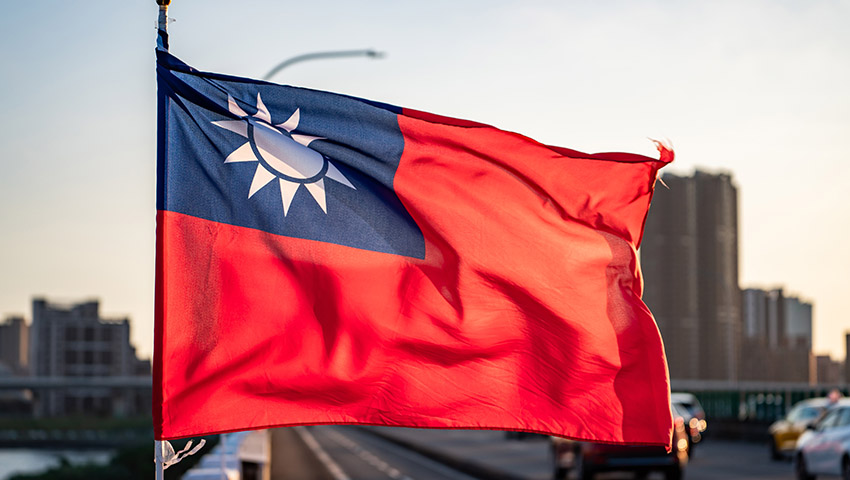The recent escalation in tensions between Beijing and Taipei has underscored the need for ADF preparedness, with the threat of conflict more present than ever, ASPI executive director Peter Jennings observes.
To continue reading the rest of this article, please log in.
Create free account to get unlimited news articles and more!
Since the turn of the year, Chinese warplanes have repeatedly entered Taiwan’s south-western air defence verification zone (ADIZ), prompting fears of an imminent confrontation.
In response, the US Department of State condemned Beijing’s military posturing and reaffirmed its support for Taiwanese independence.
“The United States notes with concern the pattern of ongoing PRC attempts to intimidate its neighbours, including Taiwan,” a spokesperson from the State Department said.
“We urge Beijing to cease its military, diplomatic, and economic pressure against Taiwan and instead engage in meaningful dialogue with Taiwan’s democratically elected representatives.”
The Biden administration stressed it would advance “shared prosperity, security and values” in the Indo-Pacific region, including a “deepening of ties with democratic Taiwan”.
“The United States will continue to support a peaceful resolution of cross-strait issues, consistent with the wishes and best interests of the people on Taiwan,” the spokesperson added.
“The United States maintains its longstanding commitments as outlined in the Three Communiqués, the Taiwan Relations Act, and the Six Assurances.
“We will continue to assist Taiwan in maintaining a sufficient self-defence capability.”
The spokesperson concluded: “Our commitment to Taiwan is rock-solid and contributes to the maintenance of peace and stability across the Taiwan Strait and within the region.”
Beijing, however, was undeterred by the Biden administration’s tough rhetoric, sending warplanes into Taiwan’s ADIZ on three further occasions following public condemnation from the US.
According to the Australian Strategic Policy Institute’s (ASPI) executive director, Peter Jennings, the spark up in tensions suggest that US President Joe Biden’s first international crisis may be over the future of Taiwan.
“Beijing has been positioning for this outcome for months by steadily increasing military pressure against Taipei,” he writes.
Jennings believes Chinese President Xi Jinping is hoping to “exploit a window of opportunity” created by the COVID-19 pandemic and domestic instability in the US.
“The Chinese Communist Party’s objective is to have Taiwan under its control by 2049, the centenary of the party’s takeover in Beijing. Xi won’t be around then, but in 2021 he has built a military already dominant in the Taiwan Strait and faces a temporarily weakened US focused on other priorities,” he says.
“Does Taiwan matter as much to Biden as cutting a paper deal with Beijing on climate? Xi intends to find out.”
Jennings says President Xi is preparing the PLA for a confrontation with Taiwan, and has built “nationalist enthusiasm” for a takeover.
“Xi has nothing to lose. If, as is probable, the US stands firm with Taiwan, Xi can revert to the 2049 timetable,” he adds.
“If Biden blinks, Xi might just commit a military blunder of globally disastrous proportions.”
ASPI’s executive director expects Beijing to continue testing Biden’s resolve, hoping that the new administration would abandon the former president’s Taiwan strategy.
“Thus far the Biden administration has looked prepared and like it is intending to continue Donald Trump’s overt support of Taiwan and more active military role in the South China Sea,” he says.
“China will keep pressing for ways to weaken US determination on the defence of Taiwan. Welcome to the new normal for Indo-Pacific security.”
What this means for Australia
Jennings goes on to criticise the Department of Foreign Affairs and Trade’s (DEFAT) failure to condemn China’s recent invasions of Taiwan’s ADIZ.
The ASI director urges DEFAT to “hurry up” and respond appropriately to the sudden escalation in tensions.
“Whatever Biden does about Taiwan, he will expect Japan and Australia to be there. There is no exit strategy from our own region,” he writes.
Jennings welcomed Defence’s recent commitment to investing $1 billion in the early development of long-range anti-ship missiles, extended range surface-to-air missiles, advanced lightweight torpedoes and land strike capabilities.
As part of the investment, the nation’s current and future submarine and surface fleets are set to be fitted with anti-ship and surface-to-air missiles with a range of approximately 370 kilometres, and maritime land strike missiles with a range of approximately 1,500 kilometres.
“This is an important and welcome development. It shows that Defence is hastening to add new range and hitting power to its arsenal as other countries, primarily China, do the same,” Jennings observes.
Jennings notes that local production of long-range missiles would be essential in the event of a full-scale conflict, lauding Defence’s commitment to identifying and developing joint-production options, mostly likely with the US, which he says “cements closer alliance co-operation” and “makes practical military sense for our forces”.
The analyst also endorses Defence’s decision to explore options for jointly developing new weapons including a sea-launched weapon able to hit land targets at ranges of up to 1,500 kilometres.
“We should look to develop the ability to fire weapons from many different types of platforms, drawing on shared technology and support systems,” he observes.
“Could this even extend to the navy thinking about using the new long-range anti-ship missile just bought for the air force? Absolutely it should.”
Jennings adds that Defence must now plan for the real military challenges it could face in the near future.
“It’s possible that many Australians may be more comfortable thinking of their military handing out sweets to children in the relatively benign peacekeeping and stabilisation missions of the 1990s,” he says.
“Those images were far from the whole story and they are even further from our strategic world today.”
Jennings concludes: “These latest military manoeuvres around Taiwan are, in fact, the emerging front line of Australia’s defence.”
Get involved with the discussion and let us know your thoughts on Australia's future role and position in the Indo-Pacific region and what you would like to see from Australia's political leaders in terms of partisan and bipartisan agenda setting in the comments section below, or get in touch with
Charbel Kadib
News Editor – Defence and Security, Momentum Media
Prior to joining the defence and aerospace team in 2020, Charbel was news editor of The Adviser and Mortgage Business, where he covered developments in the banking and financial services sector for three years. Charbel has a keen interest in geopolitics and international relations, graduating from the University of Notre Dame with a double major in politics and journalism. Charbel has also completed internships with The Australian Department of Communications and the Arts and public relations agency Fifty Acres.

 Login
Login








